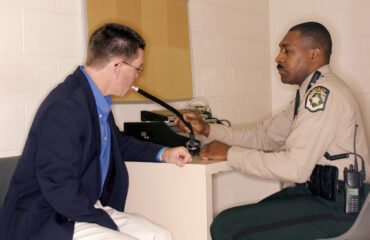On April 22, Slate reporter Leah Litman ended her story about the starkly contrasting SCOTUS majority and minority opinions in Ramos v. Louisiana with a judgement: “There is no easy way to confront race and racism in the law.” Some Justices acknowledged the history of racism underlying the enacting of the law in question; others felt that history irrelevant.

A Lack of Trust?
For the state courts, building public trust from the public requires that racism be acknowledged and confronted. Over the last four decades state courts regularly commissioned opinion surveys to measure their standing with the public.[1] The most prominent and persistent finding in these efforts is a substantial gap in levels of expressed trust in the courts, with African Americans consistently saying they have less trust in the state courts than do Whites, Latinos, or Asian-Americans.
What underlies the trust gap? Basically, African Americans rely on the same criteria as members of other groups in evaluating whether to trust the courts. Trust depends primarily on the degree to which people perceive decisions are being made through a fair decision-making process with fair interpersonal treatment (in other words, procedural fairness). Perceived distributional fairness (outcome fairness) is important but less so than perceived procedural fairness.

Another dimension along with trust that varies is the quality of the relationship trial courts have with the communities they serve. Two-thirds of African Americans believe “courts are out of touch with what’s going on in their communities.” Latinos tend to agree with that assessment as do many Whites. Trust is to some extent locally rooted.
Public Engagement in Courts
In issuing a call for more public engagement in courts, I should be clear on what this entails. Public Engagement differs from traditional court outreach.
- Outreach seeks to provide the public with accurate information about the judiciary and, in turn, receive feedback from the public to inform administrative decision-making. It usually takes the form of a series of discrete events.
- Engagement is an ongoing forum allowing two-way interaction with the public in which both sides listen to one another, recommend reforms, and take joint steps to address community and court concerns.
Engagement presents risks to both the court and to the target community. Fortunately, there are examples of engagement that can provide lessons learned from previous and current engagements. All participants in the process need to move beyond their comfort zones and that can require careful negotiation at the start. But the rewards can be substantial.

Examples of Public Engagement in Courts
The Red Hook Community Justice Center (in Brooklyn, NYC) is the best example available of the power of public engagement in courts to address community concerns and build trust among minority communities. A National Center for State Courts evaluation of Red Hook concluded: “The Justice Center succeeded in integrating itself into the fabric of the Red Hook community to such a degree that residents perceive it as a homogenous community resource rather than an outpost of city government.”[2] This success was built on extensive public engagements both during the Center’s planning process and once the Center was opened.
Another example: The Cleveland Municipal Court in 2005 responded to information about the reluctance of people to enter the downtown courthouse by establishing “In the Neighborhood,” an outreach program to publicize the availability of and facilitate the expungement of convictions for minor offenses that were interfering with employment prospects by local residents. Churches proved the most suitable venues to disseminate the information about the program, along with community centers and even corner lots. Word about the program was initially publicized via television and radio advertising, but the Court switched to social media and mass text messages as the most efficient way to spread the word on the street.[3]
Do you have examples of successful engagement to share? If so, what lessons did you learn?
[1] The State of the State Courts: A 2019 Public Opinion Survey, National Center for State Courts, 2019.
[2] Lee, C., F. Cheesman, D. Rottman, R., Swaner, S. Lambson, M. Rempel, and R. Curtis. 2013. A Community Court Grows in Brooklyn: A Comprehensive Evaluation of the Red Hook Community Justice Center (Executive Summary). Williamsburg, VA: National Center for State Courts.
[3] Turner, F. 2015. “Reducing Failure to Appears Through Community Outreach.” Paper submitted to the Institute for Court Management Fellows Program.
Get more articles like this
in your inbox
Subscribe to our mailing list and get the latest information and updates to your email inbox.
Thank you for subscribing.
Something went wrong.







Like so much of what David Rottman has done this is a very insightful piece.
Thanks, Kevin. I hope others have something to add.